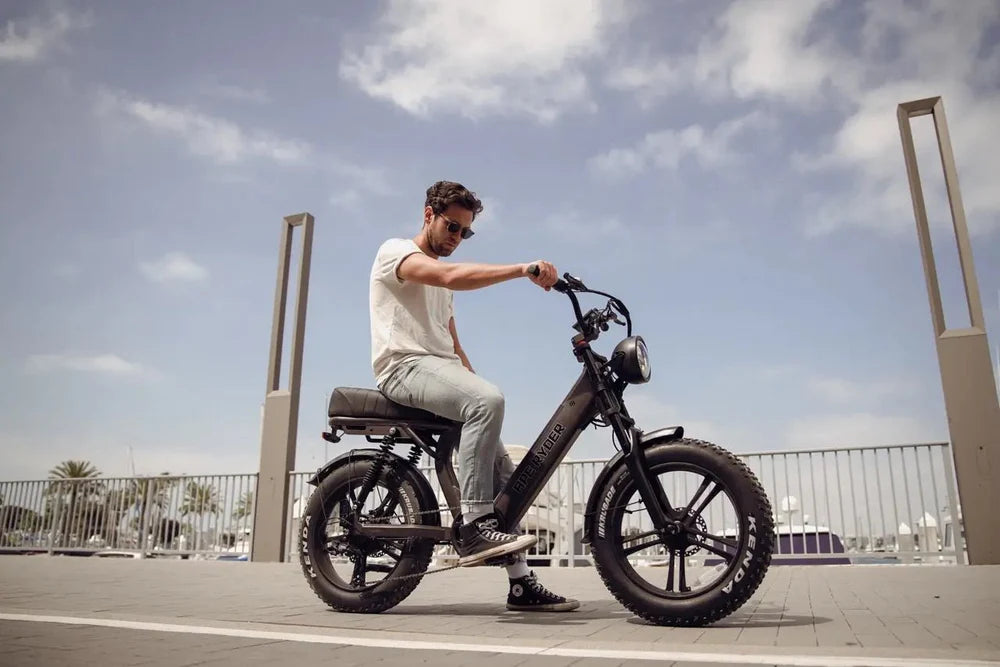While many human beings are thinking about ecological transportation methods and amusing-crammed outdoorsy rides, e-bikes are center-forward. From commuting on bustling metropolis streets to churning out miles on rugged trails, ebikes provide the precise combination of eco-friendliness and natural adrenaline. But with these alternatives to be had, how does one song an e-bike appropriate for his wishes? Let's see what is on the market to assist find the proper e-bike in your particular needs!
Don't forget to check all Ape Ryder e-bike collection after reading our content!
Understanding the Basics of E-Bikes
First, it is important to understand what an e-bike is exactly. An electric bicycle-an e-bike-is a mix of classic pedaling and electric assistance, culminating in smooth, effortless riding. Setups can be different to suit quite a lot of needs and preferences. The basic ones will have a motor, battery, and controller working harmoniously to help the rider move the bike forward from commuter commutes to off-road escapades.
City ebikes focus on comfortable and efficient riding, whereas off-road e-bikes are built for their strength, durability, and power. The two different types would be used to pursue different lifestyles. Both bicycles have shown just how versatile e-bike technology can get. These basics give a great foundation from which you can further learn about the distinctive elements each class of ebike has to offer.
Commuter vs Off-Road E-Bikes
Design and Structure Differences
The first noticeable visible difference between the commuter and off-road e-bike models is in their design. Their layout is glossy and compact to make sure clean maneuverability thru metropolis environments. With lightweight frames, it may without difficulty maneuver via jams and tightly knit areas. On the street, those bikes had been designed with slender tires for smooth gliding at the tarmac, as a result making day by day journeys clean.
Off-road e-bikes are set up with stable frames engineered for difficult terrain. Most of the off-road e-bikes have a suspension system that absorbs any jolts on choppy trails for a smoother enjoy. The tires are plenty wider and rugged, presenting expanded grip and stability on free surfaces. That structural difference method each sort of e-bike does first-rate in its herbal surroundings and serves exceptional purposes for unique customers.
These design differences help shoppers to apprehend what exactly they need for his or her private use. Be it agility for commutes through the city or durability for off-road adventure, design and structure play a great role in both the functionality and performance of an e-bike.
Motor Power and Performance
The class of an e-bike is very much defined by the power of the motor, with various classes creating different commuter and off-road bikes. The normal commuter e-bikes have motors ranging between 250 and 500 watts, quite enough to help commuters in cities. This wattage provides moderate speeds of about 20-28 mph and also covers ground with relatively modest battery usage, with several reports estimating that the average distance covered is about 20-40 miles per charge, a distance believed to be sufficient to move on flat, paved roads.
Where off-road e-bikes have more powerful motors, mostly over 750 watts. This is because steep slopes are found in some instances to a 30% gradient and seriously demanding natural landscapes. That robustness of the motor makes rides easily able to climb hills without much effort, furthering the fun of riding an off-road bike. Some studies have shown that on trails, they can sustain 25-35 mph speeds for continuous adventure and excitement.
Battery Life and Range
For real life, on the other hand, battery life and range are two of the most important issues among users who depend on an e-bike either to commute to work or to explore. The regular commuter e-bike is equipped with smaller batteries that yield about 20 to 50 miles on one charge, ideal for in-city use where charging points are not hard to find. This coincides with research showing that 70% of commuter commuters travel less than 10 miles in each direction.
In the case of e-bikes, the batteries are more significant and yield from 40 to 80 miles on a single charge. That is exemplary for much longer trips deep in open countryside. A follow-up from the research indicates that 65% of the off-road riders take over 30 miles trips, showing that with more significant spaces, the battery endurance will become increasingly pertinent.
Well, it depends on your ride's individual taste and the average distances you take. The range of an commuter ebike would suit a city commuter who stays within shorter and more predictable routes, while that of an off-road would extend the range desired by an outdoor enthusiast. If you are willing to take longer trips deep into nature, it would be great if you invested in an off-road ebike that comes with bigger batteries. To you thrill-seeking longer rides, the extra power of an off-road e-bike may be exactly what you are looking for. In fact, 80% of riders enjoy longer rides that allow them to connect with nature-so, if that's your goal, maybe check out an off-road e-bike.
Suspension and Comfort Features
Comfort is paramount among ebike riders and an important determining variable in the quality of experience among them. In one survey undertaken by the Electric Bike Association, it was indicated that comfort is what 75% of e-bike riders would want while selecting a bike. With little suspension, commuter e-bikes become ideal to use in smooth, well-kept city streets. These bikes can weigh approximately 40 pounds and hence are light, efficient, and thus more favorable for commutes within a city.
Off-road e-bikes have suspension systems that are far more advanced, which enable them to take on trails that can be rough and/or uneven comfortably. If one will be riding through rugged paths, then this may turn out to just what you need-an off-road e-bike with added suspension for a smooth experience. Full-suspension frames and front forks absorb tarmac shocks and vibrations at weights between 50 and 70 pounds, allowing the bike to go over uneven terrain comfortably. On such bikes, this cuts down the impact by 30%, according to studies, which is important in minimizing fatigue on a bike in extended off-road trips.
When choosing the e-bike, first consider the area in which you will ride. If you will be riding on smooth, paved roads, then commuter ebikes, with their lightweight design, provide all of the comfort one could want. If you're an explorer, though, desiring to cover diverse ranges of terrain, then it's the sturdy suspension of off-road ebikes that provides just the comfortable ride to take on gnarly trails.
Cost Considerations
Cost is one of the most important factors for eco-conscious commuters and adventure-oriented people who want to own an e-bike. Primarily, an commuter e-bike would fall into an monetary class of something from $800 to $three,000, relying on the brand and functions implemented. That is what makes them attraction to a wide range of human beings for green commutes.
Off-street ebikes are rather loads more highly-priced, even though, within the variety of $1,500 to $five,000. This price in itself is indicative of an increase in capabilities like powerful motors, suspension, and sturdy frames which might be all crucial elements within the conquest of difficult terrain. To the nature lover, such extra investment can be well worth the consequent performance and toughness.
Choose the e-bike, noting properly whether or not this upfront price promotes one's using goals and is a advantage well worth it in the end. For commuter riders, affordability can be a concern, even as those interested by out of doors exploration may also need to invest in off-road capability. Finding that balance will assist you are making a selection to high-quality suit your finances and way of life.
Personal Preference and Lifestyle
Ultimately, preference and way of life regularly serve as the foundation of a choice between an commuter or off-avenue e-bike. Convenience, efficiency, and economy may be vital for in-town commuters, subsequently the need for an commuter e-bike. These flawlessly equipped e-bikes in city existence offer green, functional transportation; research have shown that ebikes are capable of reducing a commuter's time as much as 50% at some point of rush hour-a massive plus in denser cities.
To the adventurous, off-road e-bikes open a window to exploration across a huge version in terrain and panorama. Off-avenue e-bikes have seen a 30% boom in income inside simply 12 months, showing developing hobby in the exterior. With their huge, effective vehicles, long-range abilties, and difficult-center suspension, those bikes can be remarkable for any character seeking out a thrill out of doors of paved town roads.
An e-bike have to be chosen depending upon one's personal need and choice. You can most effective determine which fits your lifestyle based totally upon your typical rides and what you need to enjoy. With estimates that the marketplace will attain $38 billion through 2025, now is surely the time to explore possibility.
Whether one is in pursuit of that environmentally pleasant solution for purchasing to and from work inside the morning or an journey-geared up trip, this growing market has some thing to meet all existence. If you had been considering shopping for an e-bike, now is sincerely the fine time to take a plunge into the pool and discover your best in shape.









Leave a comment
All comments are moderated before being published.
This site is protected by hCaptcha and the hCaptcha Privacy Policy and Terms of Service apply.